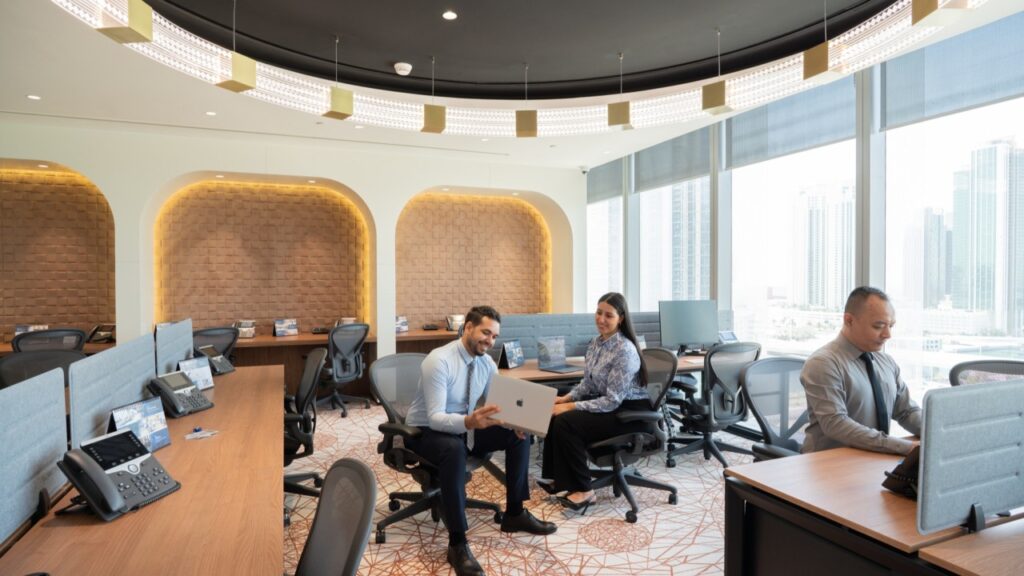In the past, having an office meant renting an entire floor, buying furniture, and committing to long contracts. But today, many people are choosing a new way to work—co-working spaces. Across major cities in the Gulf, from Dubai to Doha and Riyadh to Manama, co-working spaces are growing fast. These flexible, shared environments are becoming the favorite choice for startups, freelancers, remote workers, and even big companies.
So, what’s behind this growing trend? And why are co-working spaces becoming the new normal in Gulf metropolises?
What Are Co-Working Spaces?
Co-working spaces are shared offices where people from different businesses or industries work in the same building. You can rent a desk for a day, a week, or a whole year. There are open work areas, meeting rooms, internet, printers, coffee corners, and even gyms or play zones in some places.
Unlike traditional offices, co-working spaces are more casual, flexible, and social. You’re not stuck in one place. You can choose different locations depending on your needs.
Why People Love Co-Working in the Gulf
One of the main reasons for the popularity of co-working spaces in the Gulf is flexibility. Whether you’re a freelancer, a startup founder, or a remote employee, these spaces give you the freedom to work when and where you want. You don’t have to pay for an office you don’t use every day.

Second, it’s about community. In co-working spaces, you meet people from many industries. You can connect, share ideas, and even find clients or partners. For many people, working in such an environment feels less lonely and more inspiring.
Third, there’s the professional setting. Even if you’re working alone, you get access to conference rooms, fast Wi-Fi, clean spaces, and support services. It’s a professional environment without the high cost.
In cities like Dubai, where many expats run small businesses, and Riyadh, where young entrepreneurs are launching tech startups, co-working spaces help people grow without spending a lot of money on office rent.
Post-Pandemic Work Culture Shift
After the COVID-19 pandemic, many companies in the Gulf allowed employees to work from home. But working from home isn’t always easy. Some people find it hard to concentrate. Others miss face-to-face meetings. That’s when co-working spaces became the perfect solution—a mix between home and office.
In fact, many global companies now offer their Gulf-based employees the option to work from co-working hubs instead of regular offices. It helps save money and makes employees happier.
A Hub for Innovation and Startups
Co-working spaces are also helping the Gulf’s innovation ecosystem. In cities like Abu Dhabi and Doha, these spaces often host tech events, workshops, and networking sessions. This makes them great places for entrepreneurs to learn, meet investors, and launch ideas.
Some co-working spaces are designed only for specific industries. For example, there are spaces for creatives, tech developers, or even female entrepreneurs. These focused environments help people find the exact resources and support they need.
Real Estate Developers See the Opportunity
Property developers and investors in the Gulf are also joining this trend. They are building modern, stylish co-working spaces in business districts, malls, and even near beaches. For them, it’s a way to keep buildings busy and attract new types of tenants.
Some developers are also turning empty floors in commercial buildings into co-working zones. It’s a smart way to use space in cities where traditional office demand is going down.
Popular Co-Working Brands in the Gulf
There are now dozens of co-working brands across the Gulf. Some of the most popular include Astrolabs, Letswork, The Bureau, Servcorp, Regus, and WeWork. These brands offer multiple locations across cities, easy booking apps, and tailored services like virtual offices or mail handling.

In Dubai alone, there are more than 100 co-working locations. In Riyadh and Jeddah, the number is growing each month. Even smaller cities like Ajman and Al Khobar are seeing new co-working spots open up.
Who Uses Co-Working Spaces?
Co-working isn’t just for tech workers or freelancers. Many different types of people use these spaces:
- Remote employees of international companies
- Small business owners who can’t afford big offices
- Startups in early stages looking for community and support
- Freelancers in fields like design, writing, or IT
- Students and researchers who need quiet places to focus
- Digital nomads traveling through the Gulf
There’s also growing interest among women entrepreneurs, who feel more comfortable in inclusive and safe co-working environments designed with them in mind.
Governments Are Supporting the Shift
Some Gulf governments are also supporting this trend. They are creating co-working spaces in innovation zones or free zones. For example, Dubai’s Dubai Future Foundation and Abu Dhabi’s Hub71 are encouraging startups by offering office space, funding, and mentorship—all from shared working environments.
These moves support the region’s goal to become a global center for innovation, startups, and digital businesses.
The Future of Work in Gulf Cities
The rise of co-working spaces shows how work is changing in the Gulf. People want more freedom, better work-life balance, and inspiring environments. They don’t want to sit in traffic for hours or stay in the same office all year. They want options.
As more people discover the benefits of shared spaces, we can expect even more creative, eco-friendly, and tech-smart co-working hubs to open up.
In fact, some companies are planning membership models that allow users to work from any branch across the region, just like a gym. Others are looking into virtual reality co-working, where people meet and work in digital spaces.
Final Thoughts
Co-working spaces are not just a trend—they’re a reflection of a new way of thinking about work. In the Gulf’s fast-moving cities, where tradition and modern life meet, co-working offers the best of both worlds. It’s flexible, professional, and built for the future.
Also read: The UAE’s Smart Move Towards Artificial Intelligence


